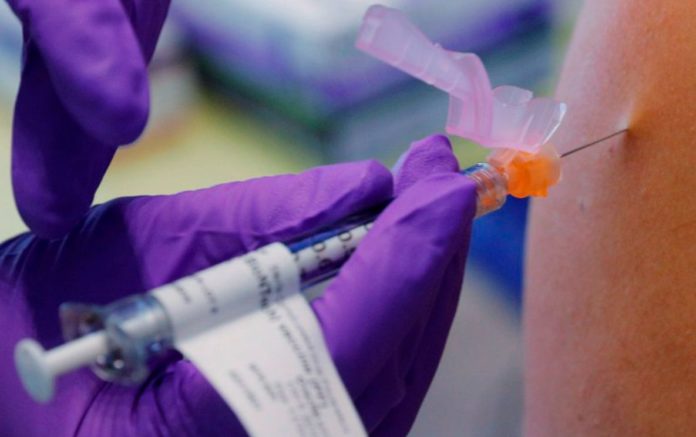What substance could be responsible for this?
Last Wednesday on January 6, The CDC COVID-19 Response Team released a document revealing 21 cases of serious allergic reactions among those who received this formula.
About 1 in 100,000 people who received Pfizer-BioNTech’s COVID-19 vaccine had severe allergic reactions, according to data from the U.S. Centers for Disease Control and Prevention (CDC), which documented 21 cases of anaphylaxis following administration of 1,893,360 injections between December 14-23.
“11.1 cases per million doses,” according to the report.
By comparison, common influenza vaccines cause about 1.3 cases of anaphylaxis per million doses administered, so the anaphylaxis rate of the Pfizer vaccine is approximately ten times higher, the U.S. health authorities said.
Nancy Messonnier, the CDC Chief Officer, meanwhile, added that anaphylaxis cases were still “extremely rare” and reiterated that it is still in the best interests of people to receive the vaccine, particularly in the context of the COVID-19 pandemic, which represents a much greater danger for their health.
According to experts consulted by Revyuh, an anaphylactic reaction is an unexpected allergic reaction, which appears quickly within an hour of contact with what causes allergy and generates reactions that can range from skin conditions in 80% of cases to affecting the airway causing bronchospasm and shortness of breath.
Some of the other symptoms include difficulty in speaking, dysphonia or difficulty in swallowing, the gastrointestinal tract can be affected causing cramping, vomiting, acute-onset diarrhea, can generate a sensation called ‘imminent death’ causes a lot of distress, produce tachycardia and hypotension.
- Does This Mean We Stopped Being Animal and Started Being Human Due to ‘Copy Paste’ Errors?
- The One Lifestyle Choice That Could Reduce Your Heart Disease Risk By More Than 22%
- Aging: This Is What Happens Inside Your Body Right After Exercise
- Immune-Boosting Drink that Mimics Fasting to Reduce Fat – Scientists ‘Were Surprised’ By New Findings
- Gun Violence in America: What They Don’t Talk About at the Debate
According to the CDC report, symptoms detected in vaccinated people included pruritus, rash, itchy and scratchy sensations in the throat, and mild respiratory symptoms.
According to current information, different possibilities were raised as a cause of anaphylaxis from the vaccine, such as possible latex contamination, but the theory being more strongly evaluated is the possibility that polyethylene glycol (PEG) may be involved, according to experts.
In the same line, the physician specializing in allergy and clinical immunology pointed out that mRNA vaccines, such as Pfizer and BioNTech, produces more allergic and anaphylactic reactions; it is believed to be due to a substance, which is a preservative, called polyethylene glycol, that is known to be one of the ingredients of the formulation.
The expert stressed that “polysorbate, a substance found in medicines and food, may have a cross-reaction with polyethylene glycol; this means that patients who are allergic to polysorbate may be allergic to polyethylene glycol.”
And note that this component “had so far not been used in vaccines”, and argued that “next-generation vaccines, such as Pfizer and Moderna vaccines, contain this element by coating the viral genetic material used in the vaccine for protecting and improving the effectiveness of the vaccine.”
- Does This Mean We Stopped Being Animal and Started Being Human Due to ‘Copy Paste’ Errors?
- The One Lifestyle Choice That Could Reduce Your Heart Disease Risk By More Than 22%
- Aging: This Is What Happens Inside Your Body Right After Exercise
- Immune-Boosting Drink that Mimics Fasting to Reduce Fat – Scientists ‘Were Surprised’ By New Findings
- Gun Violence in America: What They Don’t Talk About at the Debate
Experts recommend that “In this case, patients allergic to polysorbate should not be given the vaccine. There are other groups of patients who should not be given the vaccine either, which are those who have what is called mast cell activation syndrome or another entity, which is idiopathic anaphylaxis, but the number of patients who have this type of disease is really very low”.
Another question that people generally ask is, if they receive a COVID mRNA vaccine, what and of what type are the reactions that could be expected.
At that point, Marino summed up that “these focus on pain, swelling, reaction at the site of administration, there may be inflammation of the lymph nodes in and around the area where it was vaccinated and in some cases there may be systemic reactions, such as anaphylaxis, so it is always advised that vaccination should be administered by qualified staff to detect an allergic reaction, who are trained to treat an anaphylactic reaction and have the means to do so.”
Finally, Experts added that “allergic reactions to vaccines are rare, usually one in a million doses, and although at the moment they seem to be more frequent with these vaccines, the benefit is always greater than the risk, so this does not have to be an obstacle to vaccinating, particular cases with a history of allergies and the type of vaccines available must be analyzed ”.
